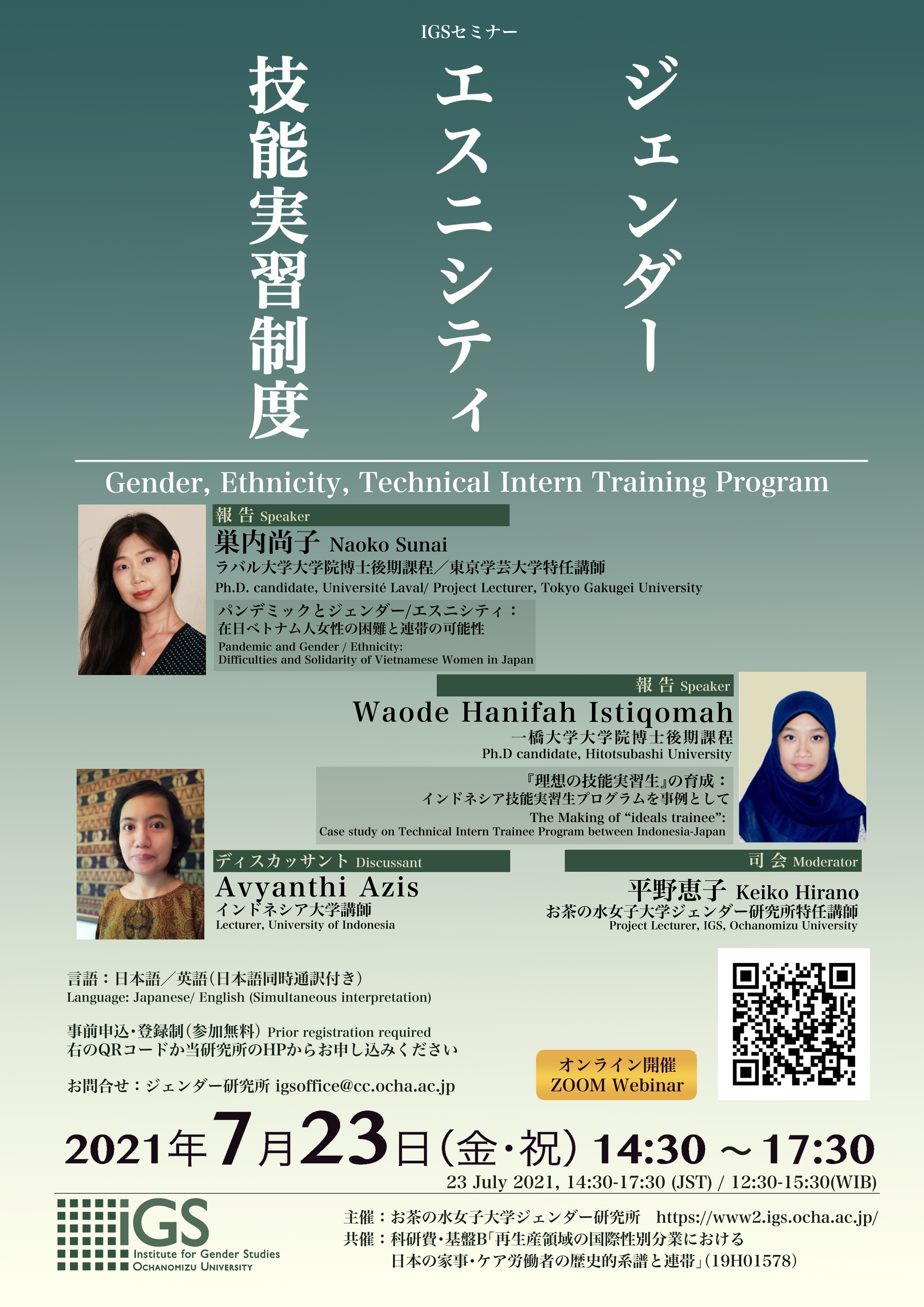IGS Seminar “Gender, Ethnicity, Technical Intern Training Program”
| Date: | 23th July, 2021 (Fri) |
|
| Time: | 14:30-17:30 (JST), 12:30-15:30(WIB) | |
| Online Seminar | (Zoom Webinar) | |
| Guest Speaker: | Naoko Sunai (Ph.D. candidate, Université Laval/ Project Lecturer, Tokyo Gakugei University) | |
| Waode Hanifah Istiqomah (Ph.D candidate, Hitotsubashi University) | ||
| Discussant: | Avyanthi Azis (Lecturer, University of Indonesia) | |
| Moderator: | Keiko Hirano (Project Lecturer, IGS) | |
| Language: | English and Japanese (with consecutive interpreting) | |
| Registration: | Zoom Registration form |
|
Research presentation Abstract “Pandemic and Gender / Ethnicity: Difficulties and Solidarity of Vietnamese Women in Japan” Since the outbreak of the new coronavirus, there have been discourses on the difficulties of “women” in Japan, but they tend to lack the perspective of ethnicity, and there has not been enough discussion on migrant women. In recent years, however, an increasing number of women of Vietnamese origin have been living in Japan, and since the pandemic, some Vietnamese women have faced challenges such as job loss, income decline, and pregnancy. Subaltern counterpublics (Fraser 1992) have also emerged among Vietnamese to support those women in the catholic community. With the perspectives of ethnicity and gender, this paper will focus on Vietnamese women living in Japan and clarify the impact of the pandemic on them. “The Making of “ideals trainee”: Case study on Technical Intern Trainee Program between Indonesia-Japan” The number of Indonesian young people coming to Japan through the Technical Intern Trainee Program (TITP) has increased rapidly over the last decade. According to the Ministry of Health, Labor, and Welfare, more than half of the sixty thousand Indonesian population in Japan have a resident status as Technical Intern (TI). Dispatchment of Indonesian Technical Intern, which started in 1993, initially began with the sending of young and unmarried men engaged in the construction and manufacturing sector before expanding to women candidate and other sectors. This presentation will focus on the pre-departure process in Indonesia and argues that the whole procedure―from the recruitment to departure―may serve as a mechanism of control in disciplining candidates to construct their body and behavior as “ideals trainee”. The idea of pre-departure training as a “civilization” in Indonesian women migrant workers case (Killias, 2019), shared strikingly similar aspect with TITP sending regime between Indonesia and Japan. One of the points should be especially discussed here is the strengthen of masculinity during the whole process. In addition, I will present how Indonesian technical trainees’ perception and understanding regarding this matter. |
|
Biographical notes Naoko Sunai is a Ph.D candidate at Univiersite Laval(Canada). She conducts academic research on women’s labor migration from Vietnam to Taiwan and Japan with gender perspective and migration system theories. Her research focuses on technical intern trainees in Japan and domestic workers in Taiwan. She also studies migrants without status of residence in the host societies. Her book Slave Labor: The Reality of Vietnamese Technical Intern Trainees (Kadensha) received the “Journalism Award for writing on poverty” by Anti-Poverty Network in 2019. Waode Hanifah Istiqomah is a Ph.D candidate at Hitotsubashi University. She has been conducting research about migration trajectory of Indonesian Technical Trainee and their integration after return to the origin community. Avyanthi Azis is a labor migration specialist with a background training in international relations. Her current long-term research (with the University of Indonesia) examines Indonesia’s positionality and policies as an emigrant nation, and explores the possibility of tapping diaspora potentials in the protection of Indonesian migrant workers. Her latest academic publication (co-authored with Ridwan Wahyudi), “Imperfect victims and an imperfect protocol: reflecting on the trafficking experiences of Indonesian migrant fishermen” is part of a special issue in Journal of Human Trafficking that marks the 20th anniversary of the adoption of the Palermo Protocol. |
Organizer: IGS, Ochanomizu University
Co-organizer: JSPS Grants-in-Aid for Scientific Research (B), “Domestic and Care Workers in Japan in the Age of International Gendered Division of Reproductive Labor: A Genealogy of Solidarity”(19H01578)


